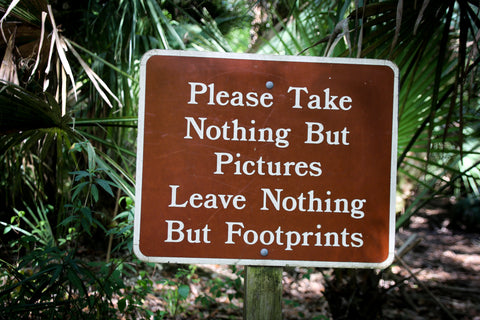Do you know the LNT rules? Leave No Trace!
Let's talk about how you can camp without harming the environment.
Leave No Trace is a set of principles that educate and provide a simple framework for best practices to minimize environmental impact.
The concept has its origins in the 1960s and 1970s, after the increasing number of visitors to national parks and nature reserves raised concerns about their impact on the environment. After World War II, a range of new recreational equipment was introduced to the market, such as tents, portable stoves, and sleeping pads. This prompted many organizations to launch "Leave No Trace" initiatives to educate visitors about how to enjoy the outdoors without harming the environment.
The education program began in 1990 and was first developed by the United States Forest Service and then administered by the nonprofit Leave No Trace Center for Outdoor Ethics.
There is no exact date to pinpoint the origin of the 7 Principles, but we do know that they have remained as we know them now since 1999:
- Plan ahead and prepare
- Travel and camping on solid ground
- Dispose of waste correctly
- Leave what you find
- Minimize the impact of the campfire
- Respects wildlife
- Be considerate of other visitors
What do you know about the 7 LNT principles? As savvy campers and outdoor enthusiasts, we strive to protect nature and ensure that it remains available and intact for future generations. So before you pack up your tent and camping gear for your next adventure, read more about these 7 easy-to-follow rules that will ensure your camping trip doesn't harm the environment.

Plan ahead and prepare
Planning your trip isn't just about deciding where to go and when. There are several other things to consider, for example:
- What activities you want to do and therefore the question: will everyone be able to participate?
- The nature of the terrain.
- Clothing appropriate to the weather, in accordance with the principles of "Leave no trace".
- Making sure there are no restrictions, private property, or anything else that may not be allowed
- Planning also extends to food and equipment. For example, you can plan all meals in advance to avoid waste and garbage. We wrote more about this in our last blog.
Travel and camping on solid ground
Rocks, sand and gravel are considered durable surfaces. So, when hiking, stay on paths and try to use the most frequented ones. Avoid vegetation or living soil, as you can damage it irreparably.
Even if you are tempted to camp in remote areas, you should stick to it and only stay in areas that are officially approved. This also applies to camping near rivers or water sources.

Dispose of your waste properly
Proper disposal of waste is probably one of the most important principles to follow in the great outdoors.
Garbage - food packaging, soft plastic, paper packaging, etc. These items can end up in rivers, harm animals and pollute the environment. One way to avoid this is to prepare food in advance and transfer it to zip-lock containers.
As a rule of thumb, if you bring something, take it back!
Disposal of human waste must be done to prevent the spread of disease and pollution of water sources, increase the rate of decomposition and also avoid other negative impacts. Visitor finds. If possible, it is best to use latrines or sanitary facilities. If these are not available, it is responsible to dig a cat hole.
Always remember that your pet's waste must be treated in the same way! Your pets' feces may contain worms or diseases and must be disposed of properly.
Dalassen what you find
This is a very simple principle: leave each natural, wild and archaeological area exactly as you found it.
Leave trees alone, don't hammer nails or hooks into them, and don't break branches. Don't pluck out flowers or otherwise create open spaces for campsites, but use existing areas. Remember the second principle: travel and camp on solid surfaces!

Attention when making fire
Campfires are romantic, but not always necessary. In any case, always try to use existing fireplaces. If there are none, create a not too big stone circle as a fireplace and make sure that the fire can not spread.
Check the surrounding area and make sure fire making is allowed.
If you have created a fire ring, you must clear it out when you leave the site, dispose of or spread the ashes, and refill the ground!
If you can, use small stoves instead of the fire. They are ideal for cooking and do not leave traces.

Respect the wildlife
Encountering wildlife is a great way to enrich our love of nature, as long as we know how to be respectful.
Always observe from a distance and do not try to feed the animals. This can be dangerous for you and, if necessary, fatal for the animal.
Allow wildlife access to food and water by staying away from water sources and not camping near vital areas.
Be considerate of other visitors
Everyone must be able to enjoy their experience as much as you enjoy yours. Avoid loud noises and intrusive behavior. Respect spaces and boundaries. If you are traveling with a pet, dispose of waste properly and keep it on a leash or make sure it does not roam free.
Be aware of the customs on hiking trails. Hikers going downhill usually give way to hikers going uphill, just as pedestrians give way to bicycles. Be sure to rest in designated areas and not block anyone's path.

